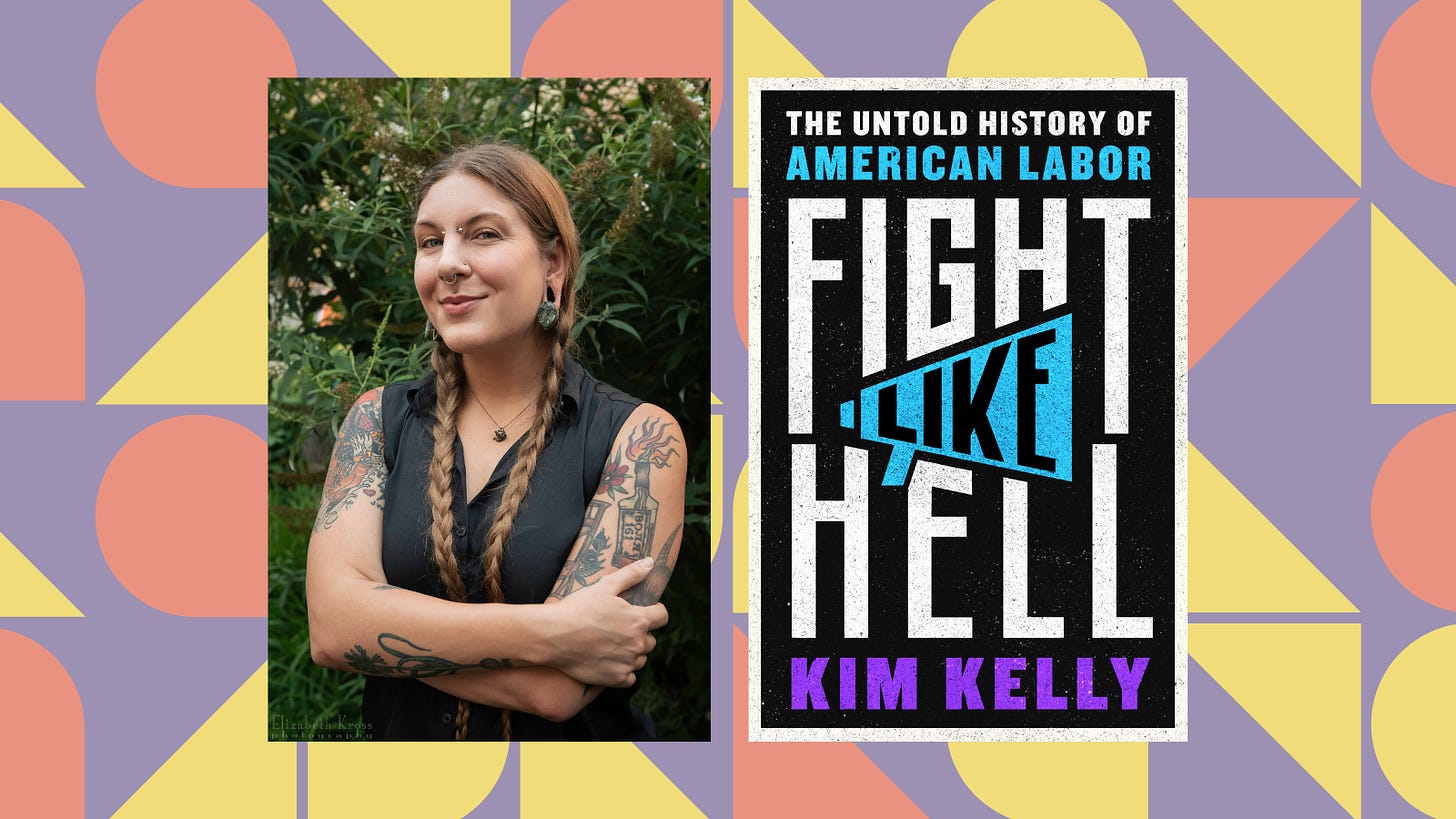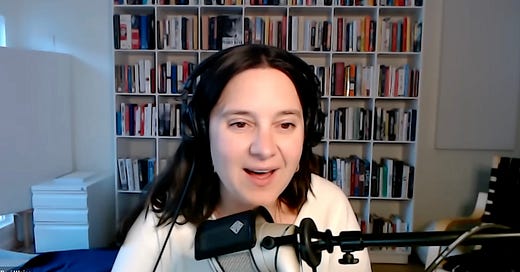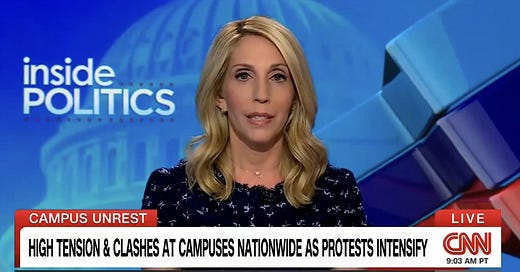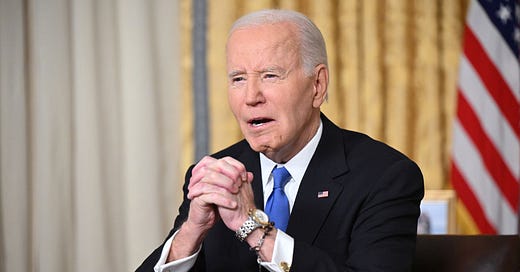
'We Are All Part of This Same Massive Centuries-Long Struggle'
Discourses with Kim Kelly about her new book 'Fight Like Hell: The Untold History of American Labor.'

Earlier this month (on April 4, to be exact) I had the pleasure of interviewing friend of the blog and Discontents comrade Kim Kelly about her first book Fight Like Hell: The Untold History of American Labor, which was published on Tuesday.
As a fellow journalist who’s done some labor reporting of my own, watching Kelly tell the stories of workers demanding their fair due during a pandemic that has pushed workers to the brink has been inspiring. In Fight Like Hell, she combines fresh reporting with historical research to bring us the story of the American labor movement through the eyes of the workers who built it, struggle by struggle, over the centuries.
The book retells the labor histories I remembered loosely learning about in public school, like the Triangle Shirtwaist Factory fire, but also highlights the people whose labor is often relegated to the shadows, like disabled workers, sex workers, and prisoners. In our interview, Kelly talked about her choice to bring them into the forefront of labor history, and how mainstream history’s exclusion of these workers and other queer workers, Black workers, and immigrant workers impacted her research.
This interview has been edited for length and clarity.
What would you point to as your moment of radicalization toward joining the labor movement and eventually writing Fight Like Hell?
I helped organize my workplace. I think that's the kind of experience it's just impossible to understand until you've done it. I was already pretty radical in a political sense, but getting involved with the Vice Union connected a lot of different threads in my life that I hadn't necessarily considered before. It gave me something to fight for that felt a little bit more tangible and achievable than revolution.
What did organizing help connect for you that you didn't see before?
I was already involved in the metal community my whole life. At that point I was also pretty deeply involved in New York's anarchist scene. Adding the union and just seeing the way that it impacted my writing, my perspective, and the way that I chose what stories and angles to pursue, I realized I always thought I was a music writer who was interested in politics, but it turns out I'm a politics writer who's really into music.
Just getting out there and seeing the ways that you can touch people's lives and actually improve them, it was pretty revolutionary. It's like, well, as much as I'd like to topple the state, getting somebody a $20,000 a year raise is pretty cool too.
I was really excited to read about your focus on disabled workers, sex workers, and incarcerated people. Why did you choose to specifically include these workers?
Everyone in this country to some extent knows that the idea of the American dream has never been offered to everyone. I've always been interested in the stories of people who fall on the other side of that, because that's what my family and so many other people have dealt with.
If the whole point of this book is to look up the stories of people who have been left out or sent out to the margins because they didn't fit whatever narrative, where are all the sex workers? Where are the incarcerated workers, the disabled folks and the queer and trans folks?
We know they've been part of the labor movement and other movements for justice from the jump. But we never really hear about them. And so I decided I have an opportunity here to bring them into the spotlight where they rightfully belong and show that we are all part of this same massive centuries-long struggle.
Connecting us to the present, a lot of disabled activists have pointed to long COVID as a prime example of how health is not granted. And yet, disabled peoples’ perspectives aren’t being included in mainstream pandemic coverage.
What parallels have you realized in the way that the labor movement has also failed to include disabled people?
There are two through lines that popped out throughout the entirety of my research for this chapter. First, so many people become disabled because of their work. They get hurt on the job. They catch a disease. There's so many ways that somebody — who people in the disability justice space refer to as temporarily abled — can switch their status up real quick. In the book, I talk about coal miners and black lung which, like long COVID, is incredibly debilitating among a smaller demographic of the population that hasn't gotten as much attention. But disabled miners and widows have fought like hell to get their benefits.
Secondly, for a very long time, people who are disabled, especially those who were physically disabled or disabled in a more complicated sense, weren't able to work at all. They had to fight to get into the workplace. In the '70s we saw the Section 504 protests, where disabled activists occupied federal buildings in a bid to get the government to do their goddamn job and enact regulations that would make it easier for disabled folks to get across the street and to get on a bus and get to work. They’re finally in the workplace, but now they're not getting the treatment they deserve or the medical benefits they need. It's like a double fuck you.
No one is abled forever. Some people just get to that point sooner. I'm a disabled person and this chapter meant a lot to me to research because I have been wanting to see those intersections between these two movements and see how people like me have fought back and found their place. All I wanted to do with this book is to show people that they belong too, and writing this chapter made me feel like, yeah, I belong too.
How much were you able to interview people for the book as opposed to using other sources?
I would joke while I was writing that the first half was so much easier because most of the people I was writing about were already dead. It got a lot tougher in the sex work, incarcerated work, and disabled chapters because so many of those pioneers are still alive. I was able to speak to Carol Leigh, who was on the vanguard of sex workers organizing in the '70s. Getting that context and that historical view was so helpful.
Throughout the book I relied pretty heavily on quotes. At one point my editor was like, "There's a lot of quotes in here." Like, yes, don't touch them. Leave them alone. Because the most powerful thing you can do in any case where you're telling a labor story is to allow the workers to describe what's happening in their own words, because they're the experts. I tried really hard to do that throughout the book, whether it was from primary sources, labor journals, books, or from calling people up on the phone or suffering through Zooms.
For some of the people you interviewed, what was their reception to you including them in a labor history book?
Some folks were a little thrown off, especially when I was talking to folks for the sex work chapter and the incarcerated workers' chapter. Sometimes they would be like, "I'm not in a union." But I just responded to that with, "Well, you organize sex workers inside, this is absolutely a history that you and your work is part of."
For example, when I interviewed Cat Hollis from the Haymarket Pole Collective in Portland, they had some very reasonable critiques of the labor movement. They said that one of the reasons they decided to have an independent organization was that in so many cases unions end up being a majority rule situation. Where does that leave the minority? For folks who have been the minority their entire lives, that's not the most attractive proposition.
It was cool to talk to people that have these different perspectives on work, labor, and the movement, who maybe see themselves outside of it but are still part of that grand tradition of worker organizing in this country.
The history we’re left with is traditionally written by the victors, and marginalized people get written out. What kind of shortcomings did you run into when trying to write a more holistic picture of some of these industries’ labor movements?
It was really hard to track down some of the people in this book, because they were relegated to footnotes, either literally or just only mentioned in passing. I'd have to dig deep to find interviews where I could get a sense of their voices or to find even scholarly articles that added a little context to what they were doing. It was always women, always people of color, always immigrants.
I tried really hard to include a lot of queer and trans voices and stories in here. But that was a tough one because that was not necessarily something that was disclosed in various points in history. There are probably a bunch of folks in this book who are queer or have a different gender identity than what was presented to me through my research. But there's no way I could even find out.
When you think about the political affiliations and views held by the folks who were doing the most potent worker organizing, there's a lot of communists, anarchists, and socialists scattered throughout labor history. It's a dangerous thing to be a radical, and people like that got buried. I tried to dig them back up, because the Democrats and Republicans did not get us here. It was always the radicals that were on the vanguard. They deserve their shine, too, even if people are scared about the idea of burning down the capitalist order.
What parallels have jumped out to you when you look at the state of the labor movement today?
It's always come down to solidarity. Every fight, every campaign, every strike, every protest, every step forward, it's because of people who stuck together and said we're not going to deal with this shit anymore.
Something that jumps out to me, with the Amazon Labor Union's (ALU) victory very fresh on my mind, I think back to a sugar plantation worker strike in Hawaii in 1946. The workers on the plantations — all run by rich, white men — were generally immigrants or first-generation folks from China, Japan, Korea, Puerto Rico, Portugal, the Philippines. And the bosses would separate them into camps so they wouldn't realize they were paid and treated differently, and potentially organize.
Organizers jumped over all those hurdles by reaching out directly to workers and speaking to them in their own languages and sharing food and cultural currency. Hearing about Filipino workers making rice for Japanese strikers and building community is the same as ALU workers making West African food to share in the parking lot: the human connection that is inherent to any workers' rights struggle.
What else do you want readers to know?
A lot of the book focuses on labor's past, but really the whole idea is to push us forward into a future that includes everybody and recognizes the contributions of everyone, and really just lifts up those who have been pushed to the margins or left out of the story, and right some of those historical wrongs. Because if you love something, you should be able to criticize it. And I love the labor movement, but we still got a lot of work to do.
This blog is part of our interview series, Discourses. To read all of our interviews, click here.











